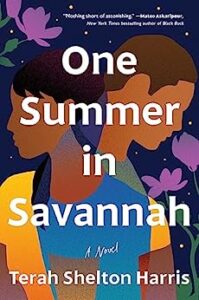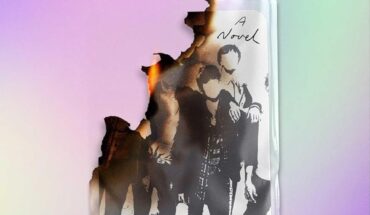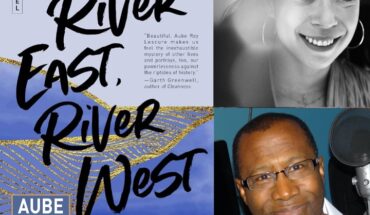 In Terah Shelton Harris’ One Summer in Savannah, it’s been eight years since Sara Lancaster left her home in Savannah, Georgia. Eight years since her daughter, Alana, came into this world, following a terrifying sexual assault that left deep emotional wounds Sara would do anything to forget. But when Sara’s father falls ill, she’s forced to return home and face the ghosts of her past.
In Terah Shelton Harris’ One Summer in Savannah, it’s been eight years since Sara Lancaster left her home in Savannah, Georgia. Eight years since her daughter, Alana, came into this world, following a terrifying sexual assault that left deep emotional wounds Sara would do anything to forget. But when Sara’s father falls ill, she’s forced to return home and face the ghosts of her past.
Debut author Terah Shelton Harris is a librarian and freelance writer, who now writes fiction with bittersweet endings. If you’re looking for a book club read—a thought-provoking kaleidoscope of grief, forgiveness, and the many ways people protect those they love—then this just might be it.
Carson: As this is your debut novel, I feel like I have to ask what the writing process was like for you. How long was the overall process of drafting, writing, and editing this book to completion?
Terah: I started writing One Summer in Savannah in February 2020. Yes, it’s my COVID book! LOL! I was on this world trip with my best friends and just decided to start writing. Prior, I had been plotting and drafting and researching this idea ad nauseum, probably because I was too afraid to start. Then, on this trip, I think we were in Paris to be exact, I started writing. A month later, in March 2020, the library where I work closed for almost three months for COVID, and I was able to lock myself in and write. I finished drafting at the end of November 2020 and spent December 2020 editing. I should add that I write my books long-hand and when I type up my notes, I edit what I’ve written, so my first drafts are more like second drafts. Yes, I edit as I go along, and you can’t stop me!
Inspiration can come at any point in the writing process. Were there any moments where a spark of creativity radically changed the plot?
I’m a proud panster. Actually, I’m more of a plantser. I cannot start writing until I know the end of the book. From there, I just write to the end. However, I don’t write linearly, which is somewhat a chaotic way of writing and I have absolutely no idea how I do it, but somehow it all comes together. I also know certain scenes and plot points I want to happen, but everything else is completely made up as I go along. Because of that, no new idea really alters the plot. For One Summer in Savannah, I will admit I struggled with the idea of whether to make Jacob and Daniel identical twins. I kept going back and forth, and when I finally decided to go for it, it didn’t necessarily alter the plot, but added a symbolic message I didn’t expect.
My favorite part of this book is the deep dive into morality and forgiveness. What served as the inspiration for the interplay between the characters of Sara and Jacob? How did you conceptualize the tension between Sara and the Wyler family?
When I started writing, there wasn’t a Jacob point of view. I’ve always felt it was Sara’s story to tell, and I didn’t want to distract readers from that. Jacob, of course, was always going to have a vital and intricate role in the story, but not his own voice. After writing the first few chapters, I realized something was missing, and I couldn’t put my finger on it. After much thought, I realized I was missing another side of Sara’s story and that Jacob could fill in those blanks. Having a Jacob POV offered direct commentary and perspective from Birdie and Daniel that would not have existed in Sara’s single POV. Also, in exploring that other side of Sara’s story, I discovered that Jacob had his own story to tell as well. Jacob is no ally of Birdie and Daniel, and his story offered a peek inside the Wyler’s and how Daniel’s crime affected them all.
Your novel evokes a broad spectrum of emotions in the reader. How did you make sure the dark moments were emotionally resonant, while not losing yourself in the heaviness of those topics?
Writing this novel was not easy, and I wanted to approach the topic with the utmost care and consideration. Especially since there is a real person attached to it. To do that, I first decided what elements of the story needed to be included and what didn’t. What moved the story forward and what didn’t. For example, I knew I did not want to include Sara’s assault on the page. While it is briefly discussed in dialogue and introspection, it is not detailed at all. Instead, I focused on Sara’s love and protection for Alana. Every decision Sara makes is in the best interest of Alana. Despite her trauma, Sara placed Alana’s needs ahead of her own and that’s a testament to the real Sara and all the Sara’s of the world.
This is a complicated story, with a narrative that twists and turns as the readers’ attachments to the characters shift. How did you keep track of the plot and character arcs?
I have no idea! LOL! I mentioned earlier that I have somewhat of a chaotic, crazed way of writing. I do not recommend ANY writer mimic me in any way! My writing style and routine should not make sense. And yet, somehow it does. I don’t have an answer for it. It’s just the way my brain works. A few years ago, I took the CliftonStrengths test, and it revealed that I have high intellection. According to CliftonStrengths, people with high intellection like to think and like to exercise the muscles in their brain by stretching them in different directions. I guess that’s how I’m able to keep track of everything.
In line with our blog name, were there any dead darlings—scenes you had to cut, but you wished made it into the novel?
Yes! I’ve been asked so many times if there will be a sequel. Without giving too much away, I think the end, more specifically, the last line I’m told, leaves readers wanting more. Sadly, for so many readers, I believe this story is told. But I’m happy to add that the last line of the book was originally not the end. An epilogue exists, and I decided to cut it at the very last minute. In fact, I’m not even sure my editor, Erin, knows this epilogue even exists. While editing, I decided against including it because I love the last line so much and I don’t think it added anything else to the story. Looking back now, I almost wish I had included it just to give readers a bit more closure. Maybe if enough readers ask me for it, I’ll add it to my website as a bonus scene.
What’s one lesson you learned in the process of writing this novel that you think every writer should know; or rather, is there something you would have liked to tell yourself before writing this book?
Start now. I should have written this book years ago. One Summer in Savannah is the first book I’ve published, but it’s not the first book I wrote. My first book, which I now call my “practice novel,” lives on my hard drive. It will never see the light of day. I learned so much about myself, writing, and publishing by writing that book, and I do not regret it. But I was disappointed that the outcome of it was not what I’d hope for. So, I pouted and didn’t write anything for a long time. I regret that. Publishing is going to knock you around. It’s going to beat you up. But you have to take those hits and keep going. So, roll your neck and crack your knuckles and get started.
One Summer in Savannah came out on July 4, 2023. You can get your copy now!
Terah Shelton Harris is originally from Illinois and now lives in Alabama with her husband, and works as a librarian and freelance writer. Her freelance work has appeared in consumer and trade magazines including Catapult, Women’s Health, Every Day with Rachael Ray, Backpacker, Minority Nurse, and more. A world traveler and photographer, Terah has visited over 40 countries across six continents. She has watched the sunrise at the beginning of America, trekked through the jungles in the Bokeo Nature Reserve, searched for William Clark’s grave in St. Louis, and much more. One Summer in Savannah is her debut novel.



